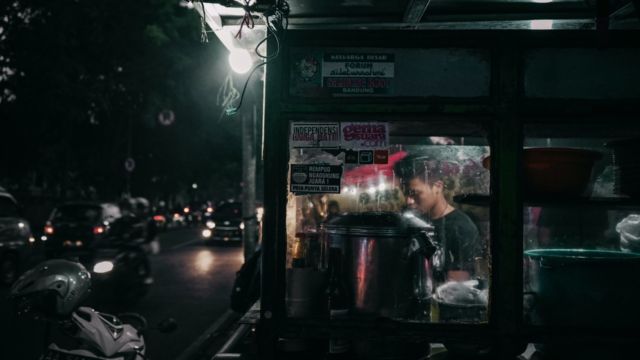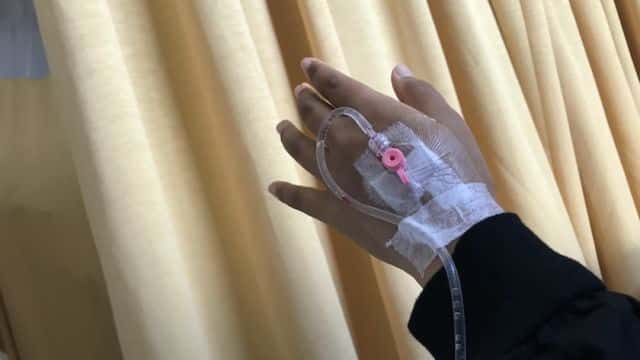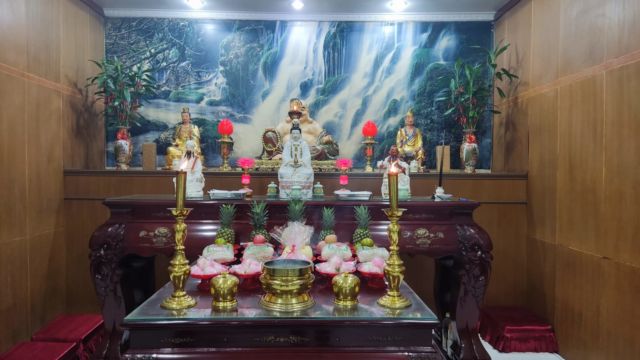How Enrolling at a Jakarta University Changed My Life
Photo: Doni Ahmadi
Rawamangun | 3,024 words
Translated from Bahasa Indonesia by Dan Benjamin
“Bastards!” said the assistant bus driver, as he gripped a wooden plank sixty centimeters long. In front of him were dozens of the high-school students who routinely made trouble on the streets of Jakarta: he was ready to take them on. But his invitation was not accepted, for the group of students, with their unkempt dress — school shirts untucked, chains dangling from the sides of pants, bandannas used as masks to disguise their identities, and caps full of doodles scrawled in marker pen — instead dispersed in various directions: towards a truck that happened to be without cargo, to Jalan Pemuda, to disparate places besides.
What I’ve just described occurred in October 2009 in front of the campus of Universitas Negeri Jakarta (UNJ), in Rawamangun, in the city’s east. That large bus, with the number “P.905” on it, finally came to a halt after initially refusing to stop for the students. Its front windscreen had been smashed-in, by a stone thrown by one of those schoolboys without decency. The assistant bus driver’s rage couldn’t escalate further only because he was unable to run fast enough to catch any of the students: his plank of wood, when he swung it, merely struck air.
This sort of scene was normal throughout the 2000s and until about 2013 in various parts of Jakarta. A large group of high-school students would try to stop and commandeer large buses or trucks without cargo, vehicles big enough to take all of them to places that would bring them into contact with other high-school groups, for a single purpose — they wanted to do that most senselessly irrational activity in the world, stage a student brawl. When such scenes unfolded it was the buses, and their drivers and assistant drivers, who most often lost out, from students refusing to pay fares, to the other passengers who opted not to ride out of fear, to the risk of vandalization, because any bus that a gang was riding would invariably become the target of another gang’s rampage.
I was one of that group of high-school students who ran away from that assistant bus driver, towards that truck without cargo — a truck which had been brought to a stop by a group of our seniors at about the same time as our stopping of that bus P.905, 100 meters further up the road. As I recall this incident now, I realize that it was my first-ever encounter with the Jakarta district of Rawamangun. An encounter that’s ugly to recall, from an era full of machismo, of toxic masculinity. But — and this is something I never would have expected at the time — my subsequent encounters with Rawamangun were transformative for me.
Rawamangun became my metaphorical “home” in 2012, when I was accepted into Indonesian Literature within the Faculty of Languages and Arts at UNJ. As somebody who didn’t have any sort of preferences after graduating high school, choosing a major and campus was for me more like throwing a dice. For a guy who rarely read books, and spent his time in a music studio, I never expected that my wager would end up making me feel the luckiest of people.
My second piece of luck, after my choice of field of study, was being born to middle-class parents who had ambitions to get their child a university education, whatever the major. For them it was a source of pride, especially since neither my mother or father had ever experienced university because they had to go straight to work after graduating high school. A huge responsibility, I thought.
The best part of Rawamangun was, in that place, I fell in love with reading and found college to be a place to talk about anything into the early hours. The district also made me feel at home because of all the cheap food available, spread along Jalan Haji Ten in Sunan Giri and the wartegs in the alleyways and lanes off Jalan Pemuda. Rawamangun was well-capable of acting as a night-time base for us students, and myself and many, many friends often chose to stay overnight so we could chat about everything from the sacred to the profane. The campus secretariat room, the pendopos (pavilion-like structures of Javanese design) that stood in front of faculty buildings, and the kos dormitory rooms of my fellows can all bear witness: to all of those places, I give my thanks.
In the pendopo outside Q Building, for example, I still remember like it was yesterday the atmosphere during a discussion after a screening of the film Pengkhianatan G30S/PKI. At that time, those of us who still counted as new students were asked our opinion of what we’d seen. One of my fellows, Inno, innocently answered that what had been done by the Indonesian Communist Party during the bloody events of late 1965 was extremely cruel. I only nodded my agreement at this — and the subsequent reaction from our seniors was laughter. Inno’s answer in reality epitomized the way the New Order had successfully perpetuated its propaganda and stigmas, phobias of the communists and ideas about their supposed cruelty not ever having been extinguished in Indonesia even though over five decades have passed since 1965. And that was what I had experienced for 17 years of my life, that manipulation of history. The feeling was of surprise, wonder, and curiosity all blending into one, although I was fortunate that the last of those turned out to be the strongest.
At the end of the discussion, Ambon, a slightly older classmate, handed Inno and I a book by Asvi Warman Adam. This became my introduction, as a new college student, to dissident histories which have never reached the grassroots because the powers-that-be put their hands on the scales, with remnants of the New Order still holding power in the government. That first book became my gateway to other works of dissident history, by John Roosa, Onghokham, Peter Kasenda, and many others. The resulting feeling of curiosity made me and several other friends feel fortunate, and so we continued onto still-other books, which I tended to devour in spare moments before entering class, before going to sleep, or in the campus canteen of M Building in the time before my food arrived.
That sort of basic receptiveness to new things doesn’t, of course, come from nowhere, and I was fortunate too to be studying Literature, because doing so made me more sensitive to many things, from increased empathy through efforts to understand the different viewpoints of fictional characters, to studying themes and plot-lines, to disassembling the discourse production and ideologies authors write into their works. So alternative histories became one more topic we discussed with enthusiasm, often.
Around 2012-2013, I became aware that university is one thing, and networking another. The latter always happened after the lecture halls had closed. I was lucky because in Indonesian Literature there were lots of communities I could join, even though in the end I only stuck with one, Tembok, where I began to try many things: writing, turning poetry into songs, staging dramas, making performance art and short films, and lots more.
What helped make the networking possible was, again, the particular spaces provided by Rawamangun. From the campus’s back gate you only need to turn left, go through the Sunan Giri public cemetery, and take a left again at the first intersection and there, right in front of Sunan Giri Market, you’ll find the coffee shops and eateries that stay open until 3am. It’s to those wheeled carts whose vendors always “work overtime”, so to speak, that the people of Rawamangun, both locals and UNJ college students, go to celebrate small victories.
I started to spend lots of time talking about literature with not only Indonesian Literature students, but also Hamzah. He was studying English-Language Education, and was two years ahead of me. Our group met Hamzah at a unique moment: after he had got bored talking to people in front of O Building, Hamzah had made to go home, but on a whim he’d gone to stop by the campus canteen in M Building, and en route had passed us, busily chatting in the Q Building pendopo. The direction of Hamzah’s footfalls had suddenly shifted and without any hesitation he’d joined in one of our routine chats about literature which happened every Tuesday evening.
“All of you, if you’re here til late like this, d’you sleep here?” asked Hamzah while gesturing to the pendopo.
“Yeah, or if not here then in front of BEM” said Gembel, my colleague.
“Anjrit, but so many mosquitoes”.
“Relax, we come prepared, that’s why these guys are burning,” replied Gembel while pointing to me and several other friends who were regularly setting alight trash to ward-off the night-time invasions of mosquitoes — honestly a real pseudoscience, now that I recall it.
“Anjing, that’s absurd, haha”.
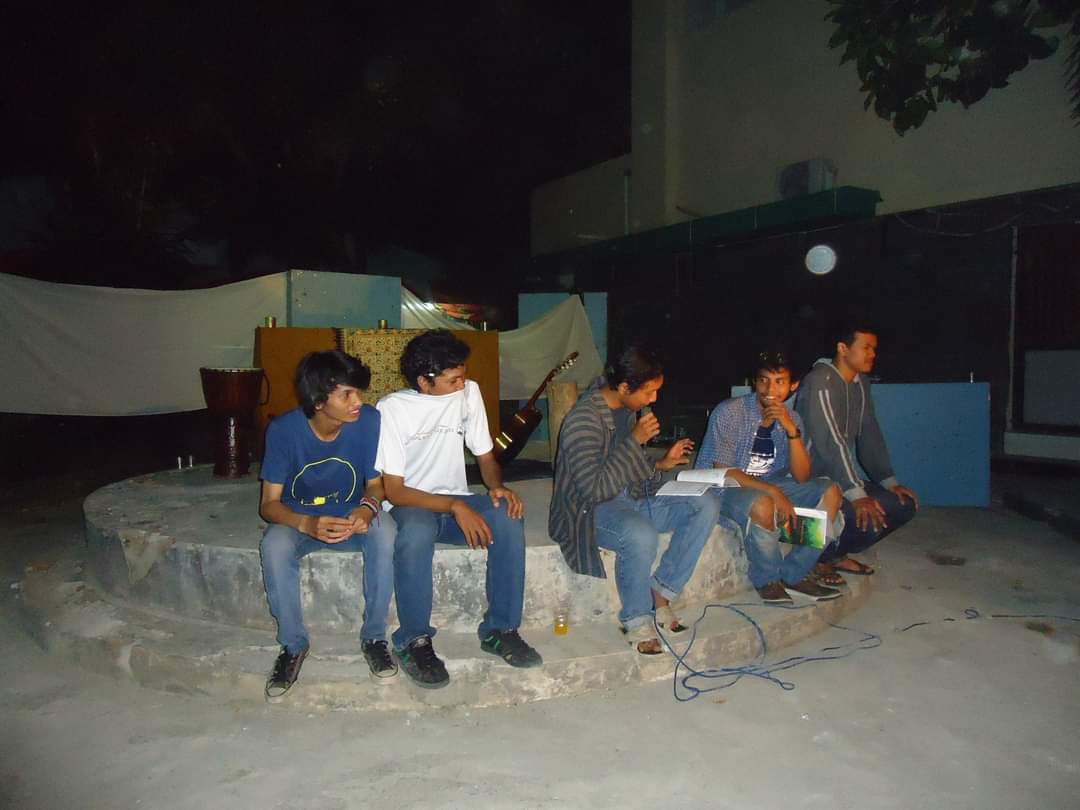
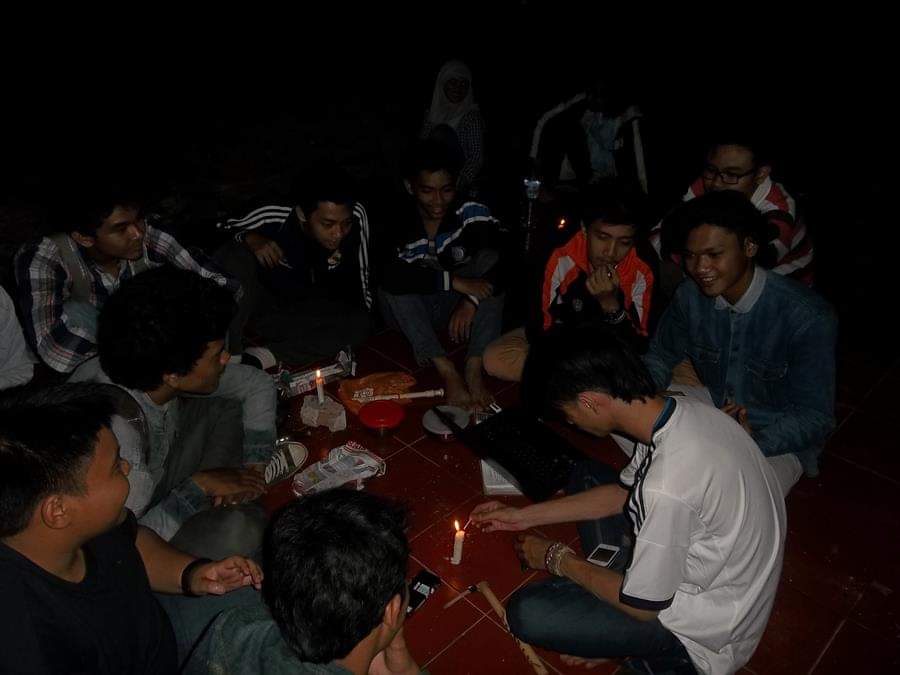
Hamzah could be called our savior because he invited all the Tembok community to spend the nights at a better place, the Secretariat of the Student Learning Institute. That community, like the other student organizations headquarted in G Building, had a lounge with 24 hour access: university students could stay overnight without fear of being driven out because keys were entrusted by the campus to student leaders. We of course felt very lucky, and I like to think Hamzah felt the same way, for he’d got himself some fellows to chat with about books until dawn — something he’d rarely done before, because at the Student Learning Institute they more often discussed politics and history. Hamzah told us that he’d already heard about us before he met us: Irsyad Ridho, a lecturer in Indonesian Literature who knew his mother, had told him there was a group of Literature students who liked to hang out all night and had suggested Hamzah should stop by if he wanted to talk books.
Our meeting with Hamzah and ultimately other fellows at the Student Learning Institute also led to the founding of the campus zine Stomata: of Literature and Like Matters. The idea was simple: create some literary writing that would be accessible to people on campus, not be exclusive and invite contributions from anybody of all majors, then bring the zine out entirely through the efforts of volunteers. It was fascinating to watch from behind-the-scenes the process of Stomata being made, beginning with fundraising for printing costs, which was entirely made up of donations by lecturers, students, and even the result of busking all around campus and into the surrounding Rawamangun streets.
Inside Q Building dozens of Literature students sorted and stapled page after page of Stomata so that all copies were in sequenced order. They were accompanied by dozens of packets of nasi uduk from Genjing Market or nasi kuning from Sunan Giri that arrived all at once, to be enjoyed together; glass after glass of sachet coffee served in plastic glasses; and mosquito coils that made much more sense as a way to reduce the mosquito blitzkriegs of the Rawamangun night. All for the sake of a zine of 500 copies which could be taken free by anyone who wanted one. “Charitable works”, we thought, how naive.
Until this point, you’ve perhaps been thinking that Rawamangun doesn’t provide any space for romance, and you would be very wrong about that. Let me introduce Arion Mall, a linchpin location for UNJ students and Rawamangun locals to kick off their dates. At Arion, a hundred thousand rupiah was enough money. With that in our pocket we could shout whoever we were wooing to a film and an ice-cream at McDonalds — though if our stomachs were still rumbling after that, then it was better to move to a simple dinner in front of Sunan Giri Market. Mall food could be an option if you really did have extra in your wallet, but with the choices and affordability around Sunan Giri, most students opted to go outside. Doing it that way also helped ensure the cost of romance did not erode the funds allotted to hanging out and talking through the night on campus.
Apart from Arion, the roof of the UNJ parking lot was another option for couples on a frugal budget, i.e. college students. Usually guys and girls would buy snacks and bring them up there, then eat and chat while sitting on top of their scooters. If the executants of such an activity are Literature students, it’s certain that such moments will become poetic: from such spots will be born mencintaimu-dengan-sederhana stanzas by Sapardi Djoko Damono. Other people will do other things: if it’s a normal person, then I suppose it will all be very normal.
I experienced Rawamangun, and I wrote about it, and it was in Rawamangun that my writing first found an audience. I remember when a short story of mine was published by a national newspaper for the first time, and how there was a simple celebration in Rawamangun with my fellows from Tembok in the pendopo in front of Q Building. Not to be outdone, Arion also took part, because I could invite Dias to watch a movie, and in fact could actually offer to treat her to a meal at McDonalds afterwards.
*
“I just want to eat some Soto Surabaya in front of Sugir,” said Dias, the last word being an abbreviation of “Sunan Giri”.
“Okay”.
After watching a film at Arion, we hurried over there. The Soto Surabaya of Sunan Giri had indeed become a mainstay menu item for us when coming from the cinema or after we’d been out and about elsewhere. Dias perhaps was aware that her boyfriend didn’t quite have enough cash to throw around carelessly. Plus the taste of the soto – full of slices of chicken, bihoon, cabbage, fried shallots, half a boiled egg, several big spoons of rice enveloped and drowning in its yellow broth, all for a price of 11,000 rupiah – seemed even more delicious when eaten after a late screening or after riding around the streets of Jakarta in the cold of night.
Even though Dias and I had the same major, we were in different classes and so were never in the same room. What happened was that a colleague at Tembok acted as matchmaker: he continuously did something I’d never actually instructed him to do, and said hello on my behalf to the woman who was to become the mother of my children.
During the initial 10 minutes of our first meeting, barely any words got out beyond “nice to meet you”. Fortunately, we both saw we had the same brand of smartphone, a moment that seemed to me miraculous, because after that, words began to flow more easily. The plan was for me to drive her back to her place, but plans being just that, plans only, something came up, and I only ended up escorting her to the middle of a footbridge spanning a thoroughfare. Then Dias walked down a set of steps to get to the halte — the bus-stop for the Transjakarta rapid transit system — that stands in front of UNJ. From where I was, I watched as a blue-colored bus came to a stop there. And when it set off again, carrying Dias and all its other passengers, I remembered again my first meeting with Rawamangun — the halte was not far at all from the spot where that P.905 bus had been halted.
Dias and I had each other’s telephone numbers: the rest is history.
*
After I graduated and started work, Rawamangun was effectively still “home” for me, primarily through the Jung Coffee Shop located in the district’s west which joined the pendopo by Q Building as another of our gang’s provisional hangout spaces. In that café me and my fellows from Tembok continued to spend evenings drinking coffee and having conversations, but now in a more dignified environment: this place provided tables, chairs, and adequate lighting, all rather different from the Q Building pendopo which featured exactly none of those amenities. Tubruk coffee became my usual at that place, especially using Acehnese Gayo Wine beans, and if my friends and I found our gastric acid acting up again, the culinary treats of Sunan Giri were still ever-ready to act as a balm. If there ended up not being time to bring our conversations to a satisfactory close, then like it or not, it was back to the front of Q Building, despite the fact we’d all graduated.
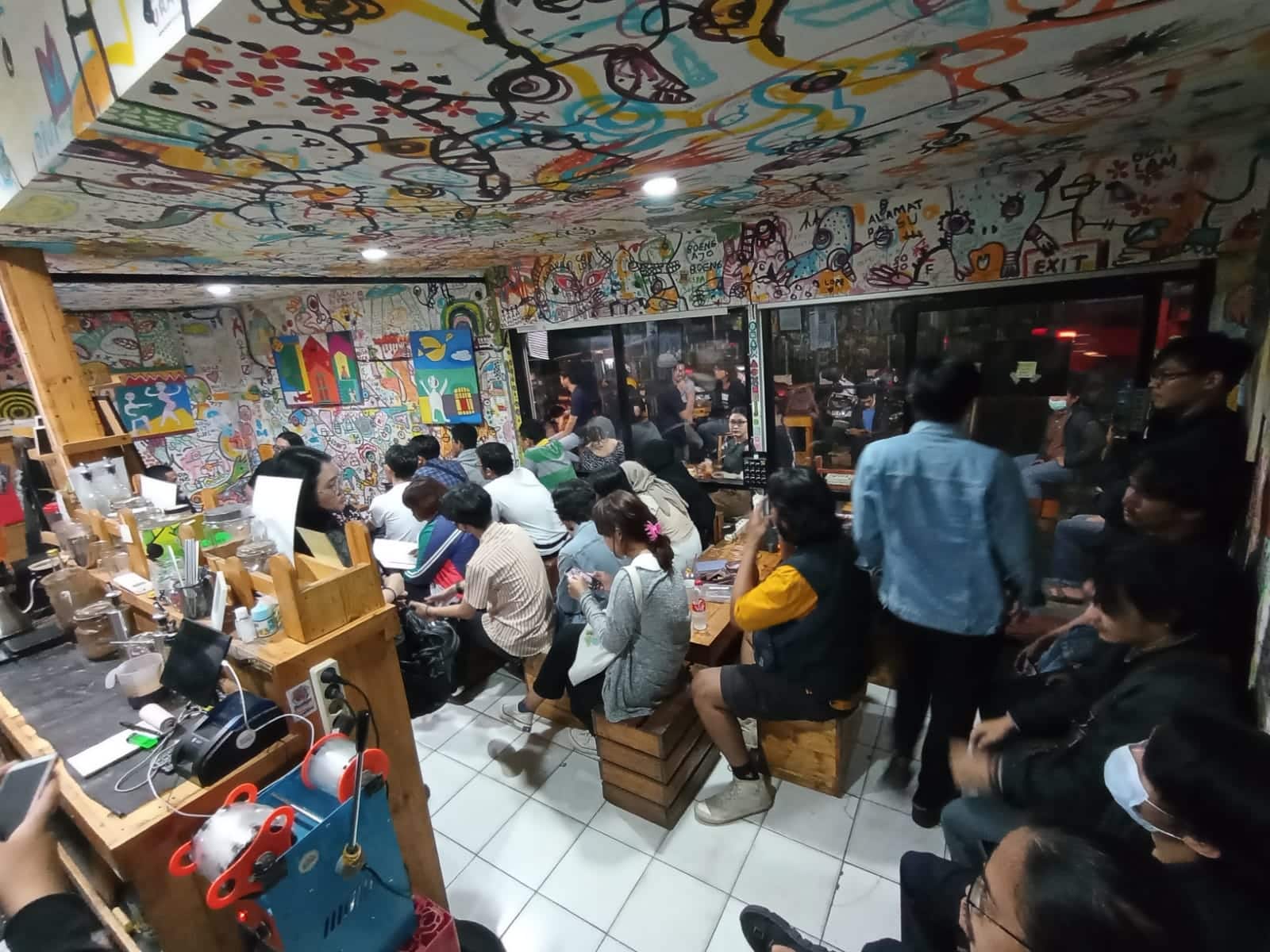
In the coffee shop we still talked about literature, invited contemporary writers to speak about their books, had film screenings and discussions afterwards, and Jung Coffee Shop could also act as a good space to type alone if we had some sort of side-hustle to get done. It was here, also, that Isryad Ridho invited me, Hamzah, and other fellows from the editorial team at Stomata to imagine yet another venue: another arts space in the guise of a café where college students could work on their creative projects, a place that would be open and inclusive, welcoming whoever. While they began to strategize over that, I was taking another path, establishing an independent publishing house. We knew we would support each other in our respective endeavors: that’s the way of the people you find in Rawamangun.
*
“Hey, hey!”
Qori welcomes me: she, her husband Hamzah, and their son Timur have arrived before us at Kedai Atelir Ceremai, the space they helped to build, the space that Irsyad had dreamed of. I give her a warm greeting in turn through a smile and handshake; behind me are Dias, my wife, and Alga, my own child. After Q Building and its pendopo were razed to the ground, as UNJ has started to construct new buildings and abandon old ones that are no longer fit for the 2020s, Atelir Ceremai has become our new place.
In the future, when Timur and Alga come to know words and sentences, I’ll tell them how Rawamangun formed both their fathers, and brought their fathers together with their mothers. How Rawamangun was full of food that was delicious and affordable, food that became a reprieve when literature took a break, and the cinema likewise. How Rawamangun taught their fathers to think, to talk, to read, to write, and to question. How Rawamangun represented an enormous stroke of good-fortune. I’ll tell them stories of the miracles that happened to us in that place. An education indeed.
© Doni Ahmadi
English translation © Dan Benjamin




